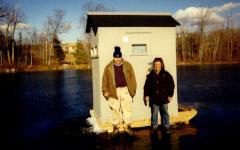ICE FISHING IS NO JOKE
|
August is not the time to think of ice fishing although when the temperature hits 100 degrees one hunts up ice for a drink. The reason the subject came up for me is that I was looking into genealogy and remembered the Sherer family spent many winter hours on or about the ice. Grandfather, James Thomas Sherer, and his three brothers were born in Sartell, Minnesota, an unincorporated village on a small narrow channel in the Mississippi River. Actually the channel widened when the dam was built downstream for all the reasons that dams are built. Sartell became a village because people had to live somewhere and for some peculiar human reason, they like to crowd together. The first transient white folks came into Minnesota because of the magnificent trees that grew there - all over the state. Some daring fellow decided to build a paper mill above the dam. We're a bunch of record keepers so naturally we needed paper, ok? Loggers upriver sent down rafts of logs for the mill. It seemed there was just no end of trees. However, there was no satisfying an empty stomach by sitting around to admire those trees so naturally people cut them down. Some enterprising fellows got together and built a sawmill to cut the logs into lumber for other folks who wanted to live together. That's just dandy. Do you know how much sawdust piles up when a hundred thousand board feet of lumber is sawn? Well, I never measured it but let me tell you, it piles very high. But with all the houses filled with loggers who naturally brought in women to cook and such, wouldn't you know those women got on their high horses and wanted to keep meat from the ducks and geese and rabbits and pigs fresh so they could cook it for dinner. They tried to can the meat but those loggers howled for raw meat and there wasn't a root cellar cool enough to keep the dead stuff fresh. Women from Minnesota and a few other frozen places knew that ice kept meat just fine but they got tired real quick with trying to keep the frozen meat covered with leaves and dirt all summer. They hollered at those handy carpenters sitting around after the houses were built to fix up a nice tight insulated box to keep the meat. When all the new technology and creative minds got together the ice box evolved and the cooks and such had a place for their loggers favorite meat. It helped to keep milk fresh for all the little loggers and up-and-coming cooks and such as well. Now that's where the sawdust comes in handy. Would you believe blocks of ice stashed away in buildings called ice houses and smothered with sawdust would stay frozen through the heat of Minnesota summer? Just ask any Sherer kid born early in the last century. Jim and Ron would tunnel into the sawdust like gophers and chip off a chunk for a popsicle especially after they had to haul blocks around town for cooks and such. Now comes the ice fishing part. That ice didn't just happen to freeze beneath sawdust, although most everything uncovered did freeze, plenty solid. Big machines run by ear splitting engines sat out on the frozen Mississippi and fished for huge blocks of the frozen H two O. Of course the machines didn't throw a hook and line into the water and pull out the frozen water. Big circular saws cut chunks day after day in wonderfully frigid winter weather until the ice house was packed full of salvation for raw meat eaters. A few noses, ears, fingers, and toes were frozen just to let the loggers-turned-icemen appreciate the importance of their fresh meat when the cooks and such called them to dinner. Now here's the clinker - when those ice cutters had a hole in the ice what do you suppose they did? They dropped a line and hook and really fished. Standing on the ice in the snappy winter breeze was just a wee bit uncomfortable after the first hour or so but that was no deterrent. There was plenty of scrap lumber around so they nailed a great big box together and put it over the hole in the ice and went in out of the wind. Now the icy wind had to be satisfied with howling around that little wooden structure while the people dropped their hooks through the hole. Were the fishers satisfied with standing around the hole? No. They brought in chairs to sit on for heavens sake. The warmest clothing and layers of it didn't always keep them warm. Then in came a kerosene heater - battery heated socks hadn't been invented yet. I don't know what is tastier, a walleyed pike - pulled from the water or through the ice - fried in butter, summer or winter. |
 |